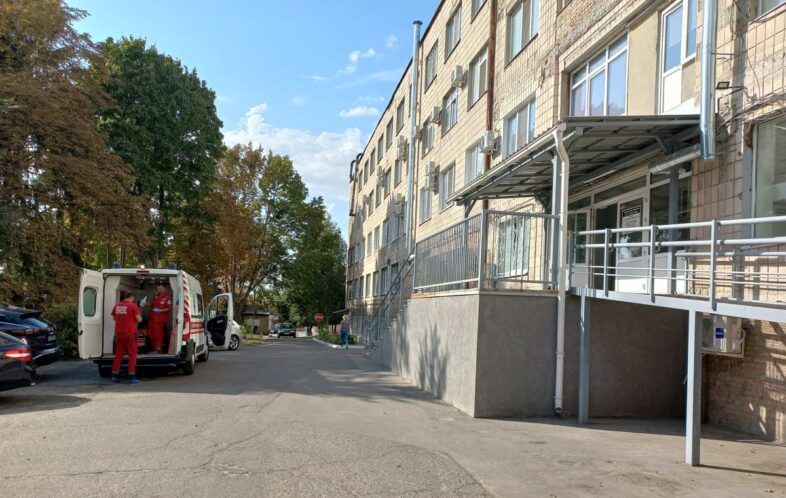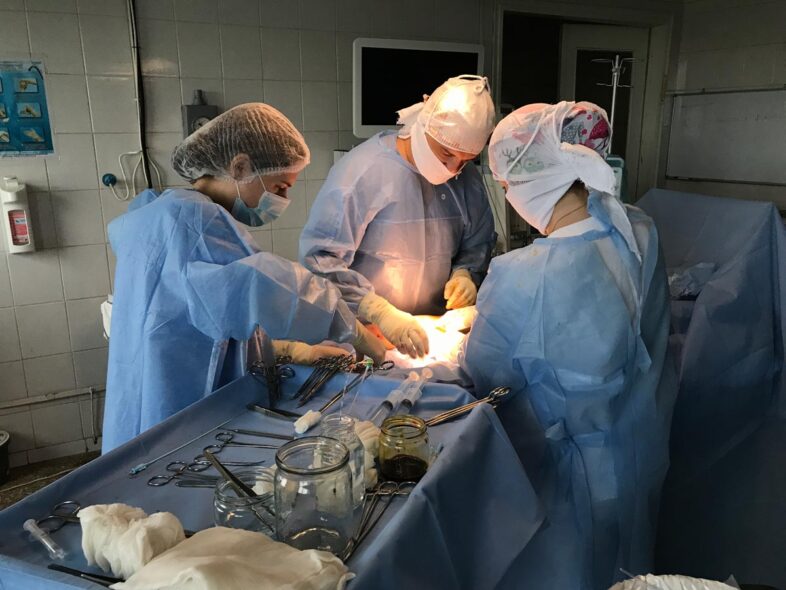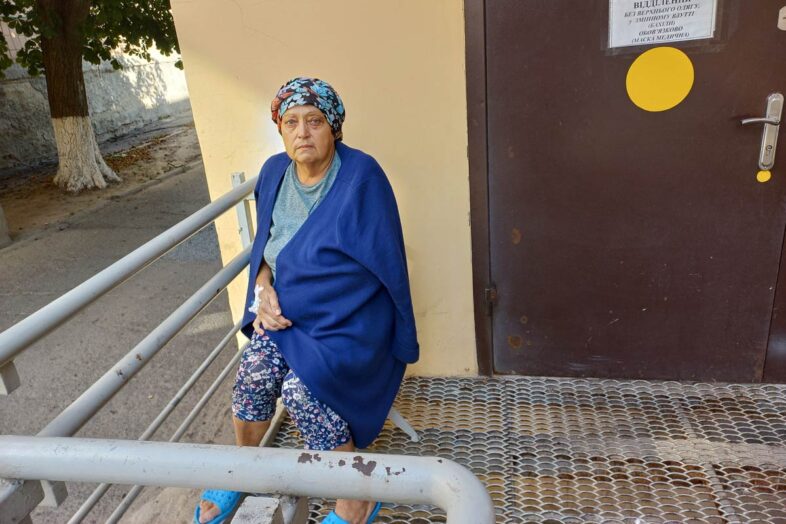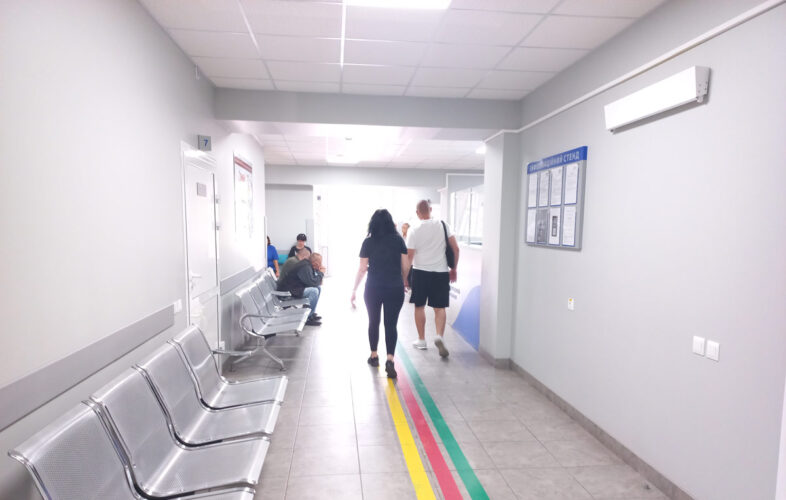In the third year of the full-scale Russian invasion, Poltava has emerged as a vital rear city in Ukraine, evolving into a humanitarian and social hub—a haven for those forced to flee from the frontlines.
In those harrowing early days of the war, hundreds of thousands of displaced individuals from Ukraine’s northern and eastern regions—Kharkiv, Sumy, Donetsk, and Chernihiv—streamed through Poltava. For many, the city was merely a transit point on their journey to safety; for others, it became a temporary or even permanent refuge. To accommodate this sudden influx, municipal facilities such as schools, kindergartens, dormitories, and boarding schools were swiftly repurposed into shelters. Some people chose to rent homes independently, while others found solace and support among relatives and friends, all striving to build new lives amidst the chaos of ongoing war.
Healthcare in Poltava
Currently, nearly 50,000 individuals displaced by the war are registered in the Poltava community, according to the Poltava City Council’s press service. These individuals face the formidable challenge of adapting to new circumstances—securing jobs, enrolling in schools and universities, and acclimating to life in a city that is now home, all while rebuilding their lives from scratch. In this context, local healthcare services play a crucial role, as internally displaced persons (IDPs) retain the right to access medical care, highlighting the essential nature of health in their new lives.
Viktoria Lisnyak, head of the local family medicine clinic, recently shared with The Ukrainian Week that all primary healthcare services for displaced individuals are as accessible as they are for local residents. IDPs enjoy the same benefits as Poltava’s inhabitants. Lisnyak pointed out that regardless of their healthcare provider or registration, individuals can visit any local primary healthcare clinic without the worry of being turned away. This commitment to accessible healthcare underscores the community’s dedication to supporting those who have been uprooted by the war.

Photo: Ella Trubiyenko
Visiting your GP
Patients have several convenient options to access care at the clinic: they can simply walk in, make an appointment at the reception, or use the Helsi app, an electronic platform that seamlessly connects patients, doctors, and both public and private healthcare facilities. “If someone presents symptoms of acute respiratory infections—like fever, a runny nose, or a cough—they can see a family doctor immediately, no appointment necessary. These patients are examined in an isolation room,” explains Viktoria Lisnyak.
Even those without a registered healthcare contract are assured medical care. Many patients are reluctant to switch to a new general practitioner—or family doctor, as they’re known in Ukraine—often because of uncertainty about how long they’ll stay. But those who choose to make Poltava their home generally sign contracts with local physicians, securing consistent medical attention. This adaptable healthcare approach highlights the community’s dedication to supporting all residents, regardless of their situation.
“There are times when people who are registered at other clinics in Poltava come to us, often because they’re dealing with a high fever or severe pain. We accept these patients since we handle all emergencies. We’ll check them out, prescribe treatment, and recommend they see their family doctor for follow-up appointments,” Dr Lisnyak adds.
If a patient requires specialist care, their family doctor can issue a referral. For instance, individuals managing chronic conditions like type 2 diabetes receive a one-time referral valid for a year, enabling direct visits to an endocrinologist without needing to consult their family doctor again.
In a significant shift, family doctors in Poltava are now treating patients with conditions that were once managed solely by specialists, including neurological disorders, trauma-related issues, and ENT ailments. To see a specialist, patients must first obtain a referral from their family doctor and then register at the polyclinic’s reception for an available appointment. This change comes as the demand for medical services has surged in the wake of the full-scale war, reflecting the evolving landscape of healthcare in the region.
“The number of patients has increased by about 20%. With more patients comes a greater mental toll, particularly during allergy season when bronchial asthma exacerbates,” notes Nadiya Khrystenko, a pulmonologist at one of the city’s hospitals. “There are times when I find myself staying an hour or two past my shift because patients are waiting outside my office. How can I walk out on people who need me?”
Medical examinations
Medical examinations are available to both local residents of Poltava and displaced persons. Family doctors usually provide referrals for most tests, although some procedures must be carried out by specialists. Patients with a referral can access these examinations free of charge.
“A family doctor can provide a referral for a CT scan, while an MRI requires a specialist’s recommendation,” explains a local physician. “Specialists also handle referrals for more specific examinations, such as rheoencephalography, which is used to detect disorders in brain blood supply. That said, there is a city program that allows us, as family doctors, to refer patients for MRIs. We direct the patient to the First City Hospital, and upon our referral, they receive a free voucher to undergo the examination at one of the private medical facilities in the city.”
However, free examinations often come with lengthy wait times, according to Poltava resident Tetyana.
“My heart started acting up, so my family doctor referred me for an ultrasound, but the wait was a month. I finally went in, and the doctor asked, ‘Why did you come so late?’ I should have called an ambulance instead of waiting. I also dislike that my chronic illness is now managed by a family doctor. I used to see a rheumatologist and was satisfied with the care I received. Now, I have to rely on a family doctor. Before the reform, I could visit a rheumatologist without needing referrals, appointments, or waiting in line. But now, it’s a different story,” Tetyana laments.

Photo: Ella Trubiyenko
Access to medication in Poltava
In Poltava, there’s a municipal initiative called “Affordable Medicines,” which helps patients access medications for free or at a lower cost through local pharmacies. However, this program is limited to those who are registered residents or internally displaced individuals.
“These medications include treatments for lowering blood pressure, managing cardiovascular conditions, and controlling blood sugar for diabetics. We also refer patients to specialists when needed. For instance, a neurologist might prescribe medications for Parkinson’s disease or epilepsy, while a pulmonologist handles treatments for bronchial asthma and chronic obstructive pulmonary disease (COPD),” explains Dr Viktoria Lisnyak.
Inpatient treatment
Lyudmyla Molchanova, a displaced person from Dnipro, has been receiving treatment in the therapeutic department of a Poltava hospital for a week now, having relocated due to the full-scale invasion.
“I started running a fever, so I went to see my oncologist since I’m under their care. I previously had fluid in my lungs, and a tumour, and I worried the fluid had built up again. They performed an X-ray, but it revealed an abscess and an infection instead. The CT machine here was down, so the doctors spent two hours searching for another facility to conduct the scan. They finally took me to a different hospital for the scan and brought me back to my department afterwards.”
“I haven’t paid a single penny for any of the IVs, antibiotics, or medications—nothing at all. You know, before, when you ended up in the hospital, they would hand you a long list of things to buy every day, and it would cost a fortune. Where were we supposed to get that money? My husband used to say, ‘If you end up in the hospital, it’s better to die at home.’ But now, even syringes and everything are free,” she explains.

Lyudmyla Molchanova, a displaced person from Dnipro, currently undergoing inpatient treatment in Poltava. Photo: Ella Trubiyenko
In Poltava, free inpatient treatment is accessible to everyone. Patients can enter either through a referral from their family doctor or a specialist or via the hospital’s emergency department, which they can access independently or through an ambulance.
“If a patient comes in on their own or is brought in by ambulance, there are three possible outcomes: immediate hospitalisation in a specific department, stabilisation of their condition in the dynamic observation ward while we determine the next steps (where the patient can stay for up to 24 hours), or a referral for outpatient treatment at their residence or to their family doctor. This applies if there is no immediate threat to the patient’s life or health,” a doctor explains.
“We welcome patients from all regions, and inpatient treatment is completely free of charge. Services such as MRI, CT scans, ultrasounds, esophagoscopy, gastroscopy, and other examinations are also provided at no cost,” explains Volodymyr Roshko, acting head of the emergency department at Poltava Hospital.
Despite the ongoing war, both the state and local authorities continue to ensure that Ukrainians have access to essential medical services. In Poltava, public healthcare institutions deliver medical assistance free of charge through national, governmental, and local programs. Here, diagnostics and medications are readily available to both residents and displaced persons, who receive the same benefits as those officially registered in the city.

The emergency department at the Poltava Hospital. Photo: Ella Trubiyenko

